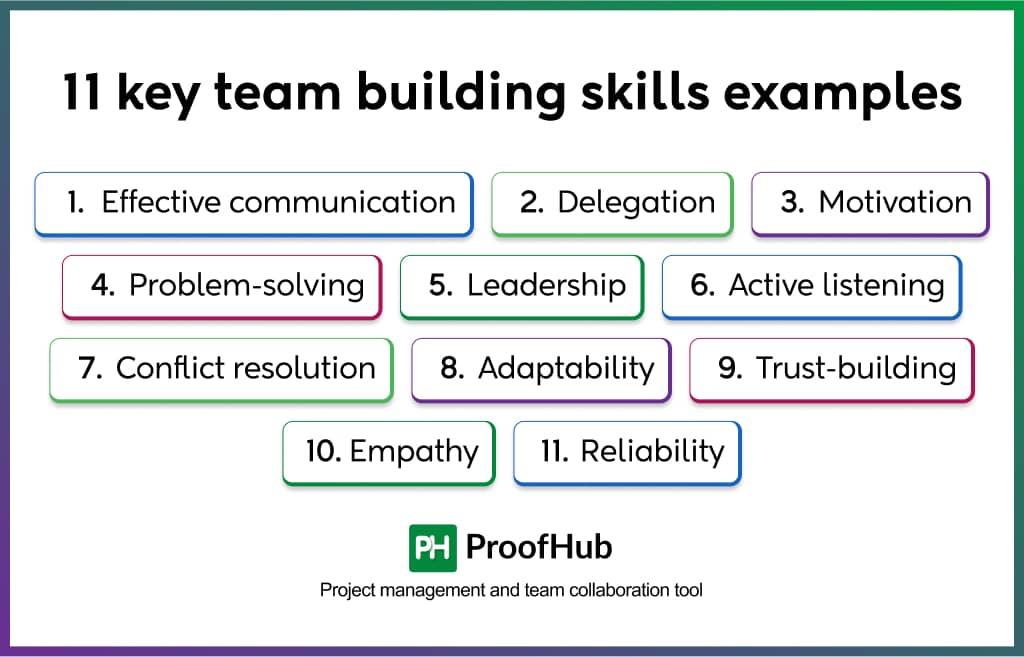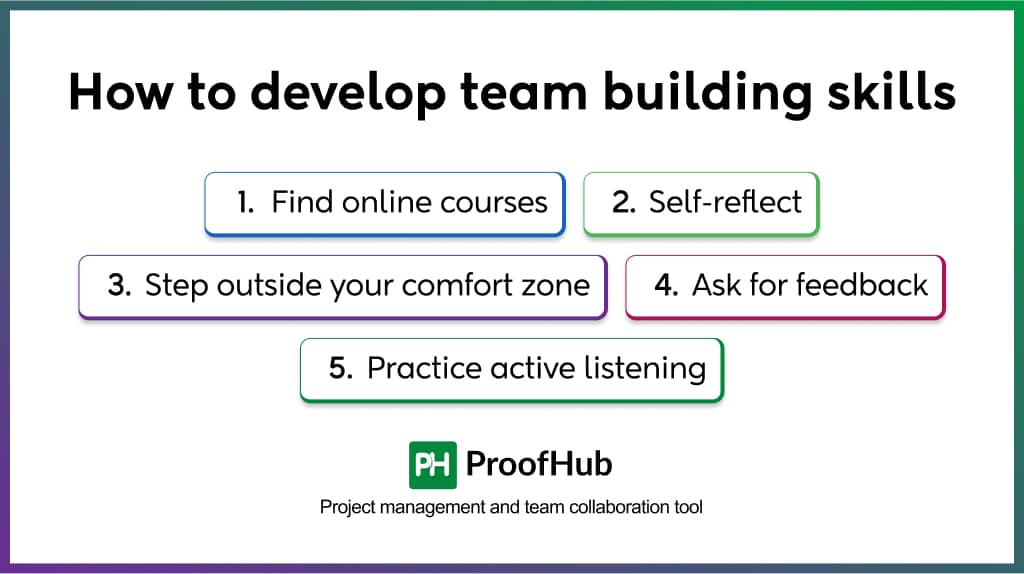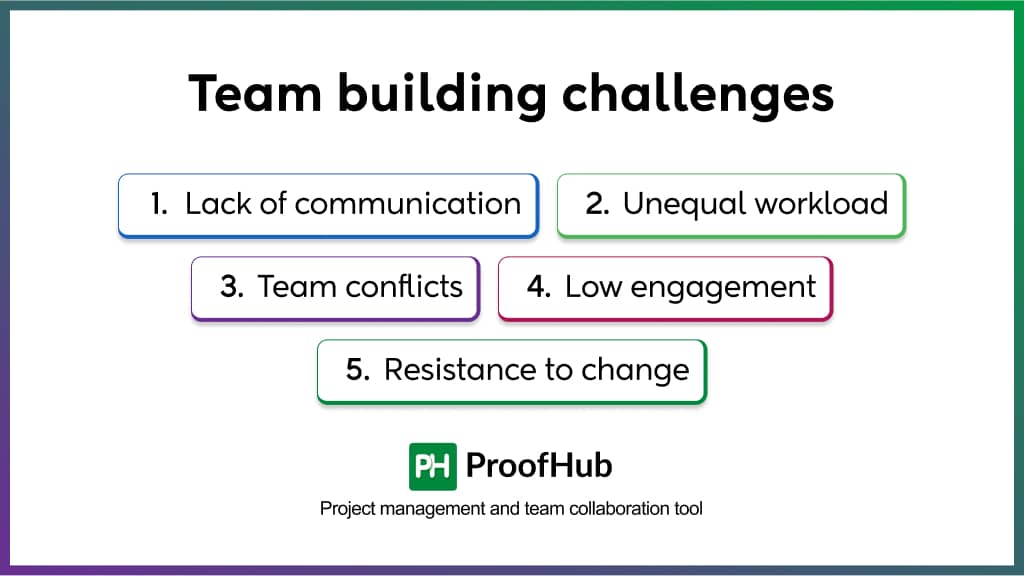Introduction
Building a high-performing team is not just about hiring talented individuals; it is also about creating a cohesive team where everyone works together toward a common goal. It is the responsibility of a manager to make sure the team is working together effectively. However, a decent share of managers struggle with it.
A recent survey shows that high-performing organizations successfully complete 89% of projects, while low performers only complete 36% successfully. Perhaps team members are great individually but struggle to work together. Thus, despite the skills, resources, and vision, teams struggle to perform.
I’ve seen this firsthand – teams with incredibly talented members still struggle due to miscommunication, lack of trust, or conflicting priorities. Based on my years of experience in managing teams, I have shared 11 essential team-building skills that helped me create teams that succeed.
Whether you’re struggling with communication gaps, or low morale, or simply want to take your team’s performance to the next level, these skills will help you succeed.
What are team building skills?
Team building skills are the abilities that allow team managers and leaders to create and maintain a strong, effective team. These skills not only bring people together but make sure that a team works well, communicates openly, and moves toward shared goals.
Many professionals confuse team-building skills with team-building activities, but they are different.
Team building skills are soft skills like communication, leadership, and adaptability are long-term qualities that help your team collaborate every day.
Whereas, team-building activities are group exercises such as problem-solving workshops, trust-building games, or team lunches that bring your team members together. These activities can help you break the ice, building trust and encouraging collaboration at the moment.
Also read – How to build a team: Strategies, importance and challenges
Why are team building skills important in the workplace?
“Coming together is a beginning. Keeping together is progress. Working together is success.” – Henry Ford
A team that works well together achieves more – it’s a simple fact. But strong collaboration doesn’t happen by chance, you need to make an effort. You require team-building skills to make your team members feel connected and supported. As a result, they’re more engaged, productive, and committed to their work.
In fact, studies also back this up. Highly engaged teams see a 23% increase in profitability and 81% lower absenteeism compared to disengaged teams. Additionally, companies with strong teamwork cultures are 25% more likely to outperform competitors in terms of profitability.
So, how do these skills create a high-performing team? Here’s how:
- Better collaboration: When people trust each other and communicate openly, they solve problems faster.
- Higher engagement: Employees who feel like valued team members are more motivated to give their best.
- Lower turnover: A positive team environment makes people want to stay, reducing hiring and training costs.
Learn how to improve your teamwork and collaboration skills!
11 Key team building skills examples
Building a strong, high-performing team requires a combination of essential skills that promote trust, collaboration, and productivity.
Here are 11 team-building skills that will help you create a cohesive, productive, and motivated team.

1. Effective communication
As a manager, your ability to communicate effectively can help your team succeed. Clear and concise communication allows you to make sure that everyone understands their schedules, deadlines, expectations, and goals.
When you articulate your thoughts with clarity – whether in meetings, emails, or one-on-one conversations – you eliminate confusion and keep your team aligned.
How to effectively communicate with your team?
Be intentional and consistent in your messaging. Use simple, direct language to avoid ambiguity, and actively listen to your team’s input to ensure two-way communication.
Regular check-ins, such as weekly stand-up meetings or quick updates, can help keep everyone informed and engaged.
Also, prioritize open and transparent communication to build trust and create a more productive and cohesive team.
2. Delegation
Delegation is never about assigning tasks. It is more about matching the right tasks to the right people based on their strengths and skills. When done well, it boosts confidence, accountability, and overall productivity.
Delegating effectively ensures that tasks are handled by those best equipped to do them, which leads to better results and a more engaged team.
How to delegate tasks to team members?
To delegate tasks effectively, you need to identify each team member’s strengths and assign tasks accordingly. For example, if someone excels at data analysis, let them handle the numbers.
Also, clearly communicate expectations and deadlines. For instance, “I need this report by Friday, and it should include these three key points.” Then, trust your team to handle their responsibilities without micromanaging. This shows that you believe in their abilities.
3. Motivation
A motivated team is an engaged team. By recognizing achievements, setting clear SMART goals, and providing growth opportunities, you can inspire your team to perform at their best.
Motivated employees are more productive, creative, and committed to their work. They’re also more likely to stay with the company long-term.
How to motivate your team members?
Celebrate milestones and individual contributions. Publicly acknowledge someone who went above and beyond on a project. Also, offer training or mentorship programs to help your team members grow.
4. Problem-solving
Every team faces challenges, but strong problem-solving skills can turn these issues into opportunities. Teams that can solve problems efficiently are more resilient and better equipped to handle future challenges.
How to help your teams solve problems effectively?
By encouraging creative thinking and structured approaches, you can help your team manage the roadblocks effectively.
Here are a few frameworks that you can use:
- The 5 Whys: Ask “why” repeatedly to get to the root cause of a problem. For example, “Why was the project delayed? Because the design wasn’t finalized. Why wasn’t the design finalized? Because the designer was overloaded with other tasks.”
- Brainstorming: Encourage free-flowing ideas without judgment. For instance, gather your team and ask, “How can we improve our customer onboarding process?”
- Root cause analysis: Identify the underlying issue rather than just addressing symptoms. For example, if a product is failing, dig deeper to understand why customers aren’t satisfied.
Explore 20 effective problem solving techniques to help you prevent issues proactively!
5. Leadership
Leadership is all about guiding your team toward shared goals while promoting collaboration and trust. Different leadership styles – such as transformational, servant, or democratic – can be effective depending on your team’s needs.
Strong leadership provides direction, inspires confidence, and creates a positive team culture.
How to lead your team efficiently?
Lead by example and show integrity in your actions. For instance, if you expect punctuality, make sure you’re always on time.
Be approachable and open to feedback. Let your team know that their opinions matter. Adapt your leadership style to suit the situation or team dynamic. For example, during a crisis, a more directive approach may be necessary.
6. Active listening
Active listening is more than just hearing words, it’s about understanding the message behind them. It builds trust, reduces misunderstandings, and strengthens relationships within the team.
When team members feel heard, they share ideas freely and collaborate effectively.
How to actively listen to your team?
You can paraphrase what someone said to confirm understanding. For example, “So, you’re saying that we need to prioritize this feature because it’s what customers are asking for?”
Use mirroring to reflect their emotions or tone. For instance, if someone sounds frustrated, acknowledge it by saying, “I can see that this is really important to you.”
Also, maintain eye contact and avoid interrupting. This shows that you’re fully engaged in the conversation.
7. Conflict resolution
Conflicts are inevitable, but how you handle them can make or break your team. Addressing issues constructively can turn disagreements into opportunities for growth. Unresolved conflicts can result in resentment, decreased productivity, and a toxic work environment.
How to resolve conflicts proactively?
Use mediation to facilitate open dialogue between conflicting parties. Bring both sides together to discuss their perspectives.
Also, encourage compromise to find a middle ground. For instance, if two team members disagree on a project approach, suggest combining elements of both ideas.
Establish constructive feedback loops to prevent recurring issues. After resolving a conflict, ask your team members, “What can we do differently next time to avoid this?”
Discover seven big project management conflicts and ways to solve them!
8. Adaptability
The best teams embrace change and adjust quickly to new challenges. Teams that can pivot in response to change, uncertainty, or setbacks succeed more in their tasks.
Adaptable teams are better equipped to handle unexpected challenges and seize new opportunities.
How to make your team adaptable?
You can encourage a growth mindset and openness among your team members to change. Remind your team regularly that setbacks are opportunities to learn.
Provide resources for upskilling and reskilling. Offer online courses or workshops to help your team stay ahead of industry trends.
Also, celebrate innovative solutions to challenges. Recognize a team member who came up with a creative workaround during a crisis.
9. Trust-building
Trust is the foundation of any strong team. When team members trust each other – and their manager or leader – they collaborate more effectively and take calculated risks. High-trust teams are more cohesive, innovative, and resilient.
How to build trust among your team members?
Be transparent in decision-making processes. Explain why certain decisions were made and how they benefit the team.
Also, hold team-building exercises, like trust falls or escape room challenges. These activities encourage collaboration and bonding.
Promote accountability within your team by owning up to your own mistakes and learning from them. For instance, if you make a wrong call, admit it and discuss how to avoid it in the future.
10. Empathy
Empathy is all about understanding your team members’ perspectives, emotions, and challenges. It creates a supportive environment where everyone feels valued. Empathetic managers build stronger relationships and build a culture of inclusivity and respect.
How to develop empathy and compassion?
To do so, you can check in with team members regularly to understand their needs. Ask them, “How are you feeling about your workload this week?”
Acknowledge their feelings and offer support when needed. For instance, “I can see that this project is stressing you out. Let’s see how we can make it more manageable.”
Also, celebrate diversity and inclusivity within the team. Recognize cultural holidays or create a safe space for open discussions.
11. Reliability
A reliable team is an efficient team. Reliability is about being consistent and dependable. When team members can count on each other, it strengthens trust, accountability, and overall efficiency. Reliable teams deliver consistent results and build a reputation for excellence.
How to be reliable for your team?
Meet your deadlines and follow through on commitments. For instance, if you promise to review a report by Tuesday, make sure it’s done.
Communicate proactively if you encounter any challenges. To do so, you can say, “I’m running behind on this task due to an unexpected issue. Here’s my plan to catch up.”
Be consistent in your actions and decisions. This builds trust and sets a positive example for your team.
How to develop team building skills?
Developing team-building skills does not happen overnight; it takes effort, consistency, and the right approach. As a manager, it’s your responsibility to make sure that your team collaborates, communicates, and supports each other.
Here are a few ways to develop the essential team-building skills:

1. Find online courses
You don’t have to figure everything out on your own. There are plenty of online courses designed to help managers improve their team-building skills.
Platforms like Coursera, LinkedIn Learning, and Udemy offer courses on communication, emotional intelligence, and leadership.
2. Self-reflect
Take a moment to think about your own behavior and how it impacts the team. Are you listening enough? Are you giving everyone a chance to speak? Self-reflection helps you become more aware of your strengths and areas for improvement.
A simple way to start is by keeping a journal. At the end of each week, write down what went well and what didn’t. Over time, you’ll notice patterns and opportunities to grow.
3. Step outside your comfort zone
Team building often requires trying new things. Stepping out of your comfort zone not only helps you grow but also sets an example for your team to embrace change.
For instance, if you’re not used to sharing personal stories during team meetings, try opening up about a challenge you faced and how you overcame it. This can make you more relatable and encourage others to do the same.
4. Ask for feedback
You can’t improve what you don’t measure. Ask your team, peers, or even mentors for feedback to understand how you’re doing as a leader. Feedback helps you identify blind spots and shows your team that you value their opinions.
For example, after a project, you can ask, “What’s one thing I could do better to support the team next time?” This simple question can lead to honest conversations and build trust.
5. Practice active listening
Your team members want to be heard, not just spoken to. Active listening means fully focusing on what someone is saying, asking clarifying questions, and responding thoughtfully.
When you listen actively, you show your team members that their opinions matter. In fact, employees who feel heard are 4.6 times more likely to feel empowered to do their best work.
So, during meetings, give your full attention and summarize what you’ve heard to make sure you clearly understand what the other person is saying.
Team building challenges and ways to overcome them
Even the strongest teams face challenges. As a manager, you need to identify these challenges early on and address them proactively to build a more connected, high-performing team.
Here are some common challenges that you can face and how to overcome them:

1. Lack of communication
When communication breaks down, misunderstandings happen, expectations become unclear, and productivity takes a hit.
How to overcome this?
You can create structured communication channels. Schedule weekly check-ins or updates to keep everyone on the same page.
Encourage open feedback loops where team members feel comfortable sharing their thoughts.
Also, implement an open-door policy where team members feel comfortable asking questions or sharing concerns.
2. Unequal workload and delegation issues
When work isn’t distributed fairly, some team members may feel overburdened, while others feel underutilized. This imbalance can lead to resentment, disengagement, frustration, and even burnout.
How to handle this?
You can use task management tools like ProofHub to assign work and distribute responsibilities fairly. Align tasks with individual strengths and skill sets for better efficiency.
For instance, if someone excels at data analysis, assign them tasks that use that strength. Regularly check in with your team to assess workloads and make adjustments as needed.
3. Team conflicts and personality clashes
Different perspectives can be a strength, but differences in work styles, opinions, or personalities can slow down progress and create tension.
For instance, one team member may like to work independently, while another prefers collaboration. These differences, if not managed, can create conflicts.
How to resolve this?
Promote open discussions and encourage your team members to share their perspectives.
You can also provide mediation or conflict resolution training to help your team navigate disagreements constructively.
By addressing conflicts head-on, you can turn them into opportunities for stronger relationships.
4. Low engagement and motivation
Disengaged employees can lower team morale, reduce productivity, and increase absenteeism and turnover rates. If your team feels their contributions don’t matter, they put less effort into their work.
How to address this?
Recognize and celebrate achievements, no matter how small. Reward your employees for their hard work – even a simple “thank you” can boost morale.
Assign work that aligns with their skills and interests. Offer professional development opportunities like training or mentorship programs. When your team members feel valued, they’re more likely to stay motivated.
Learn how to motivate disengaged employees into passionate performers!
5. Resistance to change
Change is necessary for growth, but many employees struggle to adapt to new leadership styles, processes, or technologies.
How to tackle this?
You can introduce changes gradually and involve your team in the process. Explain the “why” behind the change and how it benefits everyone.
Offer training sessions and ongoing support to ease transitions. For example, if you’re implementing a new software, provide training and gather feedback to support your team members.
Conclusion
Strong teams don’t just happen; they are built through effective communication, trust, collaboration, and continuous learning. By developing team building skills, you can create a workplace where employees feel valued, engaged, and motivated to do their best work.
To make this process easier, you can use tools like ProofHub. It’s an all-in-one project management and team collaboration software that helps you streamline communication, assign tasks, track progress, and keep everyone on the same page, helping teams work better, together.
Frequently asked questions
How are listening skills important for team building?
Listening skills are important for team building because they help team members understand each other better.
When you listen actively, you show respect, build trust, and avoid misunderstandings. This results in better collaboration, stronger relationships, and a more positive team environment.
Without good listening skills, communication can break down, leading to misunderstandings, frustration, and a lack of trust. This weakens teamwork, slows progress, and can create conflicts within the team.
How to improve your leadership skills with team-building activities?
Team-building activities help you practice essential leadership skills like communication, decision-making, and conflict resolution. You can improve by:
- Leading group problem-solving challenges to strengthen teamwork.
- Encouraging open discussions where everyone shares ideas.
- Practicing delegation by assigning roles during team exercises.
- Seeking feedback from your team after activities to refine your approach.
By participating in these activities, leaders can better understand their team’s strengths and weaknesses, which helps them lead more effectively.
How can remote teams develop strong team building skills?
Remote teams can stay connected and build strong relationships by focusing on communication and collaboration.
Here are a few ways to help your remote team develop strong team-building skills:
- Schedule virtual team check-ins to keep everyone engaged.
- Use collaboration tools like ProofHub to stay organized and connected.
- Host virtual team-building activities, such as online games or brainstorming sessions.

